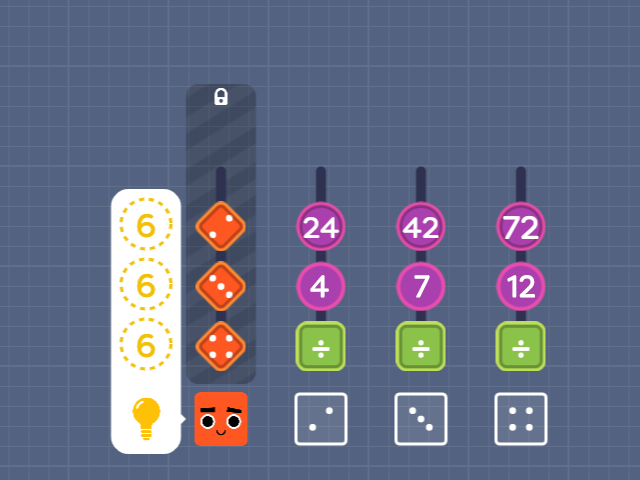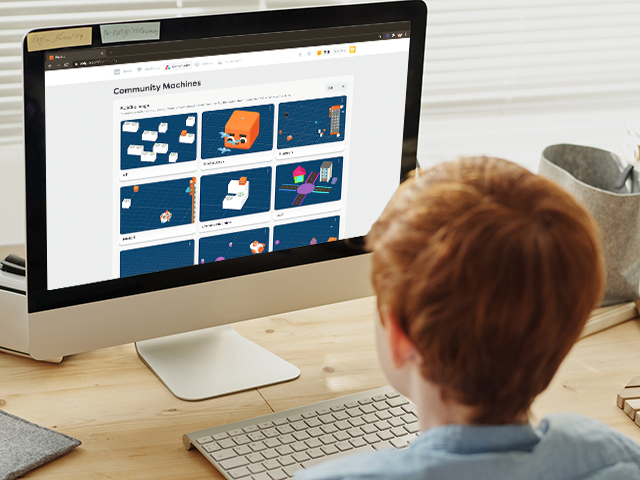
Preparing your child for the Innovation Economy
K12 Math, Computer Science, Virtual Robotics, Game Design, and Entrepreneurship Program
Enroll Now
$40 per season with CTA/CSTA Scholarship Code at checkout
🧮📱🖥🕹⚙️💡
Math, CS, STEM, Game Design, and Entrepreneurship via Scholarships
Thanks to scholarships via HIDOE, CSTA(Computer Science Teacher Association) and CTA(Computational Thinking Alliance); students and teachers can join in a virtual one week summer camp. The national U.S. Challenge inspires creativity and innovation for K-12th grade students.

From Computational Thinking to Innovation
Learn curricular Math, Computer Science, and Robotics to create innovative solutions with positive social impact, and launch your kids into high tech entrepreneurship!
Students LEARN
computational thinking and how to connect their skills aligned with Hawaii math standards and theCSTA standards to applications in real life. They have personalized progress by earning Polycoins, badges, and leaderboard positions. This is based on grade groups: K-2, 3-5,6-8, and 9-11.
Students CREATE
3D world simulations that are brought to life by math. They learn systems thinking and design thinking through building their own solutions. They can join a global community of K-12 innovators to share their creations.
Students INNOVATE
as co-founders and entrepreneurs of their own startup companies on the PolyUp Innovation Hub. They lead and collaborate on creating, refining, and simulating innovative solutions for Gigaton Carbon Removal. The top startup solutions will be submitted for Elon Musk Carbon Removal XPRIZE by Oct 1st. Students will continue to have a full access to the platform and innovation hub for four months.
Industry Leaders in Technology and Learning

Build 3D Worlds While Learning!
Activities are engaging story-driven 3D experiences that give players the joy of progress and accomplishment
Learning becomes Cool
Students build 3D visual simulations of their own stories with the power of K12 math. The joy of Aha moments and storytelling drives kids to learn and use valuable skills today, rather than solely for the sake of success many years later.
Create and innovate
Students create innovative solutions to real-life problems and share with their friends. Using 3D part libraries of science and technology, students have the opportunity to build any game or simulation they can imagine.
Weekly talks with world-renowned entrepreneurs
Join weekly Polytalks with access to world-renowned entrepreneurs as advisors and potential investors
25min
Average session time.
Versus Fortnite: 22 min/session
2x
Improvement in attitudes towards math.
in the Fall 2020 US Challenge

Learn Computational, Systems, and Design Thinking Skills
The US Challenge leverages visual, auditory, reading/writing, and tactile learning styles. Students engage in trial and error, Project-based, and Quantum learning.
Understand and ace math
Students overcome their fear of math with personalized U.S. Challenge activities. PolyUp is the pioneering quantum learning playground. It visually executes any math expression and algorithm at the most basic step of thinking.
Learn CS, Robotics, AI
PolyUp breaks boundaries by connecting Math, CS, Robotics, and 3D Geometry centered around the core concept of Computational Thinking. This 3D environment enables learning systems thinking with the ability to assign physical effects expressed in math through distributed and connected parts.
Real-time Reports for Parents.
Regular reports of your child’s skill progression, measured by awarding badges and leaderboards, provide a holistic view of your child’s learning and improvement. Seeing your child’s 3D creations provides insight to better understand their state of mind and readiness for their academic career.
STEAM Standards
All U.S. Challenge activities are aligned with Common Core and state-specific Math Standards, as well as CSTA (Computer Science Teacher Association) Computer Science Standards. The key focus is on the Computational Thinking and Creative Problem Solving aspects of the standards.
K-2nd Grade
K-2 math activities start with counting and expand to basic number sense and arithmetic operations. In CS and Robotics basic movements, and sequential logic is introduced.
3rd-5th Grades
Activities start with mastery in number sense and arithmetic operations, and expand to creative problem-solving. More geometric algorithmic concepts are introduced in CS and Robotics.
6th-8th Grades
The activities cover Algebra and geometry with emphasis on real-life applications. In CS and robotics, conditional logic and full robotics are covered. Students animate 3D Parts with math, opening the door to model STEAM.
9th-11th Grades
Activities dive into more advanced algebra, geometry, and calculus, from a computational point of view. All dynamics types are covered. Advanced algorithms and robotics are introduced.
US Challenge has three seasons, Spring, Summer, and Fall, each lasting about four months with personalized activities in Math, Robotics, and CS that earn Polycoin and XPs.
In each week, students join weekly one-hour LevelUp live sessions (grade ranges K-2, 3-5, 6-8, and 9-11) In the last five weeks, students submit one machine per week for the leaderboards. In the final week, students create a Challenge project focused on an innovative solution for one of the UN Sustainable Development Goals. Each season’s final leaderboard is based upon both the ranking of the XP’s earned and their final project machine.
27% Increase
in math performance in the NAEP Math test items
During Fall 2020 U.S. Challenge

Readiness for Innovation Economy
Most activities are engaging story driven 3d experiences that give the players sense of progress and accomplishment.

Each student submits projects to create an innovative solution to one of the UN Sustainable Development Goals and build a robust portfolio for applications to top universities.
Storytelling and SDG Projects
Each student with the premium upgrade will submit five projects during five weeks. Students use storytelling and design thinking, do research, and leverage skills in math, CS, and robotics, to build an innovative solution to one of the 17 UN Sustainable Development Goals as their Spring US Challenge project. They will have an extensive set of part libraries.
Projects Sharing and Leaderboards
Students share their weekly projects with all other students in the US and globally. Students can show and discuss their machines in the weekly live LevelUp sessions. Projects are ranked on leaderboards based on the voting of other students and Challenge judges. Students can optionally join their teacher’s class on PolyUp to benefit from their mentorship.
Final Leaderboard and PolyFest
The final project on innovative solutions to SDGs are ranked by other students and Judges. The final Challenge leaderboard ranking is half based on the final project ranking and half based on the XP gained in the Challenge math, CS, and Robotics activities. The top winners get invited to a live PolyFest session to present their machines.
See it for Yourself
Enthusiasm for STEAM skyrockets with the US Challenge, and the kids are eager to come back for more! From the thousands of K-11 students who participated in the 2020 Fall US Challenge, over 1,200 have received badges in Computational Thinking, System Thinking, Design Thinking, and Experiential Learning. More than 600 students were selected from the Fall 2020 Honor Leaderboard in the US, Azerbaijan, Kenya, Oman, Rwanda, India, and Palestine to receive scholarships for the Global Innovation Challenge and became eligible to join PolyUp Innovation Hub. Countries that do not have a national partner yet, participate in the US Challenge.
The US Challenge follow-up programs leverage the projects recognized on the leaderboards to help students with their applications to top universities.
Practicing Design Thinking
Connecting curricular math to real-life problem solving and create innovative solutions in a portfolio of projects addressing the UN Sustainable Development Goals. PolyUp Portfolio will benefit students in their applications to top universities.
Impactful Internship Experiences
PolyUp Innovation Hub accepts US Challenge honor leaderboard winners for internship programs in Design, Marketing, or Content/Mentorship tracks for a year. These experiences are also valuable to reflect in the top university applications.
Entrepreneurship Camp
US Challenge honors leaderboard winners will be eligible to apply for the Global Innovation Catalyst 8-week Entrepreneurship Camp for 5th-12th graders. GIC has other programs Certificated by the Stanford Center for Professional Development.
30,000+
Projects have been created
during the Fall 2020 Challenge in the US and 6 other country Challenges
87
Students in the US
Invited for PolyUp Innovation Hub internship from the Fall 2020 US Challenge.

You are in good company
Students love PolyUp!
Teachers support us
Parents think it's worth paying for
Spring Challenge Timeline
15
Mar
22
Mar
29
Mar
5
Apr
12
Apr
19
Apr
26
Apr
3
May
10
May
17
May
24
May
31
May
16
June
What you get
| Basic | Premium | |
|---|---|---|
| Basic | Premium | |
| Gameplay | ||
Play Machines
Created by the community of PolyUp |
Yes | Yes |
Create Machines
and share with your community |
12 parts per machine | Unlimited Parts |
Clone Other Machines
and create your own version of them |
Once a month | Unlimited |
Access Premium Parts
and create more unique machines |
||
| Challenge Activities | ||
Math, CS, and Robotics
curated activities |
Limited | Unlimited |
LevelUps Sessions
weekly online LevelUp sessions for each grade range. 1 hour each |
1 | 7 (all sessions) |
Join a teacher's Class
(Optional) work with your classmates |
||
Submit Projects
and complete weekly challenges |
||
Participate in Leaderboards
get your rank within your community |
||
Badges and Certificates
Earn Badges for different subjects, and receive a Certificate at the end of this Challenge. |
||
PolyUp Portfolio
share your PolyUp inventions in a space of your own |
||
| Service | ||
Student bug support line
Your voice is heard, and we are here to help |
||
Student learning support line
Get priority help, including hints for solving and creating activities |
||
PolyUp Innovation Hub Opportunities
Top performing students will get a chance to help make PolyUp a better place to play and learn |
||
GIC Entrepreneurship Camp Scholarships
Top performing participants will receive a scholarship to learn about entrepreneurship and the fundamentals of business |
||
Join with confidence
If you want to start immediately before the Challenge starts, you can start by signing up your child directly in PolyUp. You will participate in the spring challenge and pay full price with no scholarship codes.
When you pay here, the world wins!
For every child who signs up to the U.S. Challenge Spring 2021, three students who aren’t in a position to cover the cost of the program will get a chance to participate and join the challenge, bringing more equity and inclusion from different parts of society. Our work with various organizations and districts in the United States makes this possible.
Want to help even more students?
Sponsor a student for 1/3 of the cost, and U.S. Challenge partners will match with the other 2/3 of the cost.
You can choose to receive an anonymous report of the sponsored student’s progress at the end of the Spring U.S Challenge.
With over 25 million math problems solved, PolyUp is a unique 3D platform for players and teachers to learn, innovate, and share.
CTA is dedicated to expanding the notion of computational thinking from a math and computer science skill to one useful for all subjects.
We help organizations build powerful spaces for collaboration and knowledge creation in online Communities of Practice (CoPs) that deliver sustainable impact.

























